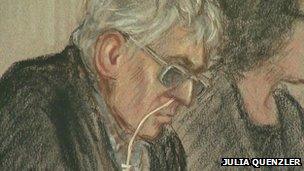Moors Murderer Ian Brady 'chronically psychotic'
- Published

Ian Brady wants to be moved from hospital to prison
Moors Murderer Ian Brady remains "chronically psychotic", the expert in charge of his case at the high-security Ashworth Hospital has said.
James Collins told the mental health tribunal assessing Brady's condition that his type of paranoid schizophrenia does not "just fade away and die".
Brady, 75, wants to be transferred to prison where he hopes to have more control over when he dies.
He has been on hunger strike since 1999 and is fed through a tube.
Brady and his partner, Myra Hindley, tortured and murdered five children, aged 10 to 17, between July 1963 and October 1965, burying some of their victims' bodies on Saddleworth Moor, near Manchester.
'Severely handicapped by disorder'
Brady was first sent to Ashworth, on Merseyside, in 1985 after being diagnosed with paranoid schizophrenia, suffering delusions and hallucinations.
Dr Collins, giving evidence during the third day of the tribunal, said he believed Brady's illness was "clearly still active".
"He is better, much better and able to control it (the illness) - but his life is still severely handicapped by his disorder, his mental illness," he said.
"He is acting like someone who is chronically psychotic."
Brady wants the tribunal to judge that he is no longer ill so he can move to prison - where he hopes he will not be fed against his will, so he might try to starve himself to death - although his precise intentions remain unclear. Ashworth Hospital opposes any bid to move him to a prison.
Dr Collins said Brady had paranoid beliefs about fellow patients and staff.
He said Brady thought patients were spying on him, and that staff were agents for the Home Office and Prison Officers Association.
Brady wrongly believed that others were out "to get at him" and he had spilled cereal outside one man's door and smeared the chair of another with jam and honey.
Dr Collins said that over the past eight months Brady had barely come out of his room, unless at night or when other patients were in the canteen.
Brady's wish that he could "send cancer in an envelope" to one doctor was one example of the anger which was the driving force for his paranoia, the tribunal was told.
But Dr Collins said he was not aware that Brady was paranoid before he was jailed.
'Dreading consequences'
He said Brady had managed to hold down a relationship with Hindley, a job, and "sideline work" as a pornography dealer when he was a young man.
Among a "whole range" of psychotic episodes - "many of them pleasant" - experienced by Brady were talks with entertainers Laurel and Hardy, and Cilla Black.
Asked to predict Brady's response if he were returned to prison, Dr Collins said he thought there would be a "period of triumph", but that "he is going to be frightened".
"He has always said prison is horrible. He had a horrible time at Durham and he would not come out of his room at Parkhurst.
"He is going to be frightened... he won't admit it. He is going to be dreading the consequences. I am not sure he will come out of his room."
He said he thought it might be "relatively quick" for Brady to return to his condition as it was in 1985 when he experienced overt hallucinations, adding that it could take "only a matter of weeks".
- Published17 June 2013
- Published13 June 2013
- Published17 June 2013
- Published18 August 2012
- Published17 August 2012